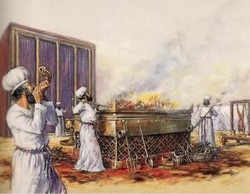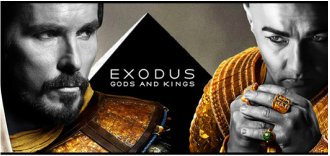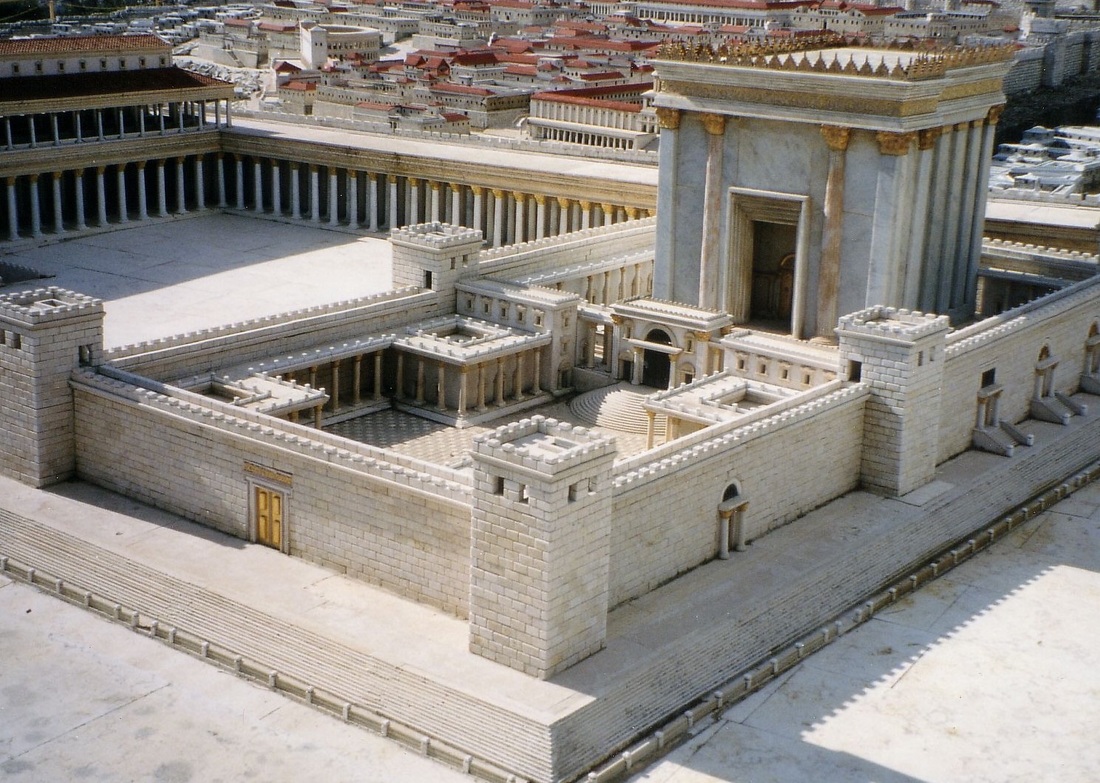
 People often wonder why I discourage personal Bible reading when you have no prior training or present community to keep you on track. Case in point: "End of the World" predictions tied to blood moons that happen on Jewish holidays. When you have a Bible to quote but have not the Bible study skills to interpret it, you are a danger to yourself and everyone else. Every author, tv personality, and blogger predicting the imminent "Day of the Lord" fits that bill. They represent a 1500-year old line of apocalyptic prophets who quoted Bible verses but didn't know what they meant in the first place. The latest manifestation is turning astronomical imagery in Joel 2:31 and Revelation 6:12-17 into a cosmic signal of Judgment Day.
5 Comments
 Only one Gospel talks about the “church.” Do you know which one? And why? If the church is Jesus’ great legacy, you might think he would talk about it more. But don't make any unnecessary conclusions. Jesus talked about a new community forming around him. He just didn’t talk about it like Christian churches would after he was gone. Who did Jesus talk like? Talking Like a Rabbi
We can learn how to listen to Jesus by observing how he delivered his message. Pay attention to the details. Jesus' favorite topic was the “kingdom of God.” A third of his recorded sayings in the Gospels are in parables. He launched his ministry by picking a band of disciples to follow him. What do those details tell you? Only one category of teachers we know from Jewish history used parables constantly, focused on God's kingdom, and gathered disciples: Jewish rabbis.  On June 26 2015, my wife and I entered a courtroom to adopt 2 young kids. These beautiful siblings had faced the horrors of neglect and abuse. But this day was redemption. After 2 years and 3 months as foster parents, we crossed the line. We committed ourselves to lifelong care and responsibility for 2 more lives. With 3 biological and 2 foster children in the seats next to us, the Judge asked if we were ready to embrace this sacred task: "Now Mr. Penley, can you please explain to the court why you believe it is in the best interests of the children to be placed in your family?" Here is our reply. The Son of Man Coming on the Clouds Right before Jesus was arrested, he issued a bold prediction from the same location the “Egyptian” rallied his prophetic movement: the Mount of Olives (Matthew 24:3). He told his disciples, as they admired the grandeur of the Temple, that trouble was coming. They would suffer great persecution because of their allegiance to him. Armies would invade Jerusalem. The magnificent Temple would crumble (Matthew 24:2; Luke 21:20-24). And in the midst of chaos as people fled for their lives in Judea, prophetic hopes would be fulfilled. Jesus’ words didn’t fill empty space in first-century Israel. The place was crowded with competing ideas. Power-hungry men appealed to Rome for political position. Spiritual leaders wandered the streets rallying the impoverished masses to their definition of “righteousness.” Every vocal leader was trying to carve out his piece of the pie.
First-century Israel had a line of would-be Messiahs making predictions. The Jewish historian Josephus recalls how “Impostors and demagogues, under the guise of divine inspiration, provoked revolutionary actions and drove the masses to act like madmen. They led them out into the wilderness so that God would show them signs of imminent liberation” (Jewish Wars 2.259). Their plans didn’t always work so well. Theudas the magician called himself “a prophet” and led a group of followers to the Jordan River. He promised to divide the river as a sign of Israel’s restoration to greatness (based on Isaiah 51:10-11). It didn’t go as planned. He only succeeded in getting his head cut off by the Romans (Josephus, Antiquities 20.97-98). A man nicknamed “the Egyptian” led a Jewish mob up the Mount of Olives with a promise to fulfill Zechariah 14. But instead of an earthquake splitting the city and God’s army defeating foreign invaders, the Romans cut the mob down. Roman swords often cut short the hopes of long-awaited redemption. Theudas couldn’t kickstart Isaiah’s prophecy nor could “the Egyptian” fulfill Zechariah’s vision. Why does it matter? Because Jesus spoke into that world. His predictions of coming redemption were equally rooted in Jewish prophecy and tied to contemporary political affairs. We must listen to him in that context.  Can Christians excuse themselves from obeying the Law of Moses? Jesus plainly said, “Until heaven and earth pass away, not the smallest letter or stroke shall pass from the Law” (Matthew 5:18). Surely that would mean all 613 commandments in the Pentateuch must be followed until some cataclysmic events take place. Or does it? If we were still waiting for some cataclysmic event to happen before we were set free from obedience to the Mosaic Law, what would that practically mean for Christians today? It would have huge implications. If “heaven and earth” haven't passed away, we would have a backlog of Jubilee years to celebrate, “cities of refuge” to resurrect (which is a law requiring certain cities to protect sinners from people trying to vengefully hurt them), and bleeding lambs to burn on an altar. Forget Sunday. We would need to go back to the Sabbath rest on Saturday. And we would have to throw out our clothes that mix linen and cotton and kill our rebellious children. If you weren’t aware, the Law of Moses has some serious instructions. So why don't Christians obey every letter of the Law if Jesus said it all applies “until heaven and earth pass away”? It’s an important question to answer, and very few Christians have taken the time to address it. But before we start in forcing the law of Moses again, let’s make sure we understand what Jesus meant. The historical background is going to blow your mind. It will require you to put down your apocalyptic imaginations of meteors hitting earth and start seeing the world Jesus talked about.  The Bible is not well-named. Why? The Bible is not a book. Well, technically it has become a book. But it wasn't a book in the beginning. What do I mean? The earliest name given to the Bible is “biblia”—a Greek word for multiple “books.” Christians and Jews called the Hebrew prophetic writings “biblia” (Daniel 9:2; 2 Clement 14:2) before either group decided on a complete set of sacred books to use. In the Fifth Century AD Christians applied the term to all the books in the Old and New Testaments. The name “biblia” accurately communicated the variety of books considered Holy Scripture. However, the plural name “biblia” changed over time into a singular term, translated into English as “the Bible.” That change has caused serious interpretation problems. Treating all the different books in the Bible like they communicate meaning in the same way is a category mistake.  John Calvin’s interpretation of the Bible justified the murder of his theological opponents. He himself did not cut off any heads or light any fires that burned human heretics alive, but John Calvin’s preaching from the Old and New Testaments claimed those capital punishments aligned with God’s interests. How so? Calvin did not believe all Old Covenant laws had been set aside by the New Covenant Jesus inaugurated. He didn't buy into the plain sense of Hebrews: “God has made the first covenant obsolete” (Hebrews 8:13). He maneuvered around Paul’s conclusion: “the Law became a tutor to lead us to Christ and now that faith has come we are no longer under a tutor” (Galatians 3:24-25; cf. Rom 10:4). Calvin dismissed this data from the New Testament and decided the moral laws in the Old Covenant laws of the Torah still applied. And killing people who perverted his pure doctrine was a moral necessity. Calvin specifically justified capital punishment of heretics with Leviticus 24:16. “The one who blasphemes the name of the Lord should be put to death; all the congregation must stone him. Any foreigner or native who blasphemes the Name should be put to death.” Jesus’ teaching to “love your enemies” didn’t stop Calvin from approving and promoting the death of his theological enemies. And Paul’s instructions for dealing with people who theologically disagree with you were equally ignored: “A servant of the Lord must not quarrel but must be kind to everyone, be able to teach, and be patient with difficult people. Gently instruct those who oppose the truth. Perhaps God will change those people’s hearts, and they will learn the truth” (2 Timothy 2:24-25). Calvin did not patiently discuss his differences with people who promoted competing ideas. Calvin requested beheadings, made death threats, and praised God for orchestrating the torture of heretics. Calvin spelled out his theologically reinforced vengeance in a personal letter: “I am persuaded that it is not without the special will of God that, apart from any verdict of the judges, the criminals have endured protracted torment at the hands of the executioner.” - Calvin's letter to Farel on 24 July (for more words directly from Calvin’s pen, read Selected Works of John Calvin) Calvin believed God made sure criminals didn’t die quickly when tortured. This vengeful attitude and his support for outdated Old Covenant laws that legislated capital punishment for competing theologians that challenged his preferred doctrines look more like ISIS than Jesus.
 Since human life began, people have misunderstood why God blesses us. In the beginning Genesis 1 and 2 describe how the Creator blessed a few people with a beautiful land full of food and animals to enjoy. But those first few people did not enjoy the blessings God gave them in the way God commanded. They wanted to take every blessing from God for themselves. The first humans disobeyed God's order to refrain from one specific tree and lost many blessings as their punishment. But God was gracious. He blessed people with many children and soon the earth was full. People did not handle their newfound abundance well. Genesis 6 says people did not love each other. They did not work hard to provide for their families or care for each person's needs. Their hearts turned inward. They attacked and stole and killed each other to get more of God's blessings for themselves. So God punished them with a great flood. Humanity had failed to respond properly to the blessing of a burgeoning population. In Genesis 10-11 human beings began to form large nations with strong cities and a common language for everyone to speak. The people could have thanked God for their success and shared their blessings with one another. But the leaders decided to build great monuments and towers to show that they were more powerful than the gods. They wanted to create a wonderful world without any great God, only Great people. So they were punished and their power and towers destroyed. That is when the Bible introduces us to a man named Abram. In the land where Abram was born, most people thought gods lived above the sky. They thought the most powerful god was the moon at night and the sun during the day. Nobody knew who the real God was because their ancestors had rejected him and misused God's blessings. But God would not give up. He wanted us to know who he really is and the way we were created to live. So he spoke to Abram with a command and a promise. Now the Lord said to Abram, “Go from your country and your family and your father’s house to the land that I will show you. And I will make a great nation out of you. I will bless you and make your name great so that you will be a blessing. I will bless those who bless you, and him who dishonors you I will curse, and in you all the families of the earth shall be blessed.” - Genesis 12:1-3 Let me ask you a critical theological question about this moment in time. Why does God promise to bless Abram? Why? What is the purpose?
 Was Jesus born to save us from this world or bring peace to the earth? Luke's counter-cultural Christmas story answers this question. What a Birth Means to a Mom For many of us the story of our birth doesn't answer questions about the purpose of our life. Birth stories typically amount to no more than nostalgic moments at family gatherings. One parent (if you’re so blessed to have a relationship with one) smiles wide and recounts an anecdote for the hundredth time to the chagrin of all who must endure it. My mother is guilty of it all the time. Her favorite tale is my in utero umbilical cord trick. I had tied the cord in a knot while in the womb. When I popped out, the doctors knew I was a few good pulls away from starving myself. “It is a miracle he’s alive today,” my mom always says, normally adding, “God must have created him for an important purpose.” With this statement, my birth story turns into a mandate. It puts serious pressure on me to do things that matter. Every good thing I do now becomes potential material for my mother to link back to my providential preservation at birth. Speak of it, I really need to start producing some of that material. The Meaning of Ancient Births Ancient biographies of great figures such as Alexander the Great and Caesar Augustus use circumstances at birth to predict greatness. The Greek historian Plutarch recounted two particular signs predicting Alexander the Great’s conquest of the known world. First, the Temple of Artemis burned down in Ephesus when Alexander was born. Second, his dad’s triple victory on the day of his son’s birth tipped off the prophets to his significance. “On the same day, three pieces of news reached Philip (Alexander’s dad), who had just captured Potidaea: Parmenio’s defeat of the Illyrians in a great battle; the victory of Philip’s racehorse at the Olympic Games; and the birth of Alexander. Pleased as he surely was with these tidings, Philip was even more elated by the prophets, who declared that his son, as he had been born on the day of a triple victory, would be unconquerable.” - Plutarch, Life of Alexander 3 What did all this mean? Magi ("wise men") in Ephesus believed the burning of Artemis' Temple foreshadowed the coming destruction of the Persians who ruled the area. And they were right. Alexander did exactly that during his unstoppable conquest across the known world building the Greek Empire. The activity around his birth prophesied that conquest. It was no coincidence. That’s why ancient biographies of heroic figures began with a birth story.
If the signs around ancient births deliver symbolic messages, it makes me wonder what missing messages are tucked into the birth narratives of Jesus. What statement is being made by the sequence of events around Jesus’ birth that we overlook today?  Ridley Scott's Gladiator-style production of the Exodus is meant to be epic. And it should be. The Semitic exit from Egypt is the Hebrew Bible's greatest story of divine redemption. It is epic on paper so it should challenge our best CGI techniques to create overpowering plagues and plot twists. It should require extra dialogue, drama, and punishing death scenes to capture this monumental birth of a middle eastern people still fighting for their existence today. Although the grandeur of gods and kings in conflict will push the possibilities of our production technology, the EXODUS movie script has unfortunately exaggerated the human size of this biblical epic. That's right, not everything should be pushed to extreme proportions. Does the Exodus story report disastrous numbers of flies, frogs, and locusts? Yes. Does the story have bloody rivers, a solar eclipse, and first-born Egyptians dying everywhere? Absolutely. Does the Exodus recount 400,000 slaves exiting Egypt into the Arabian Peninsula? Absolutely Not. Those numbers make no sense, and every Hebrew scholar knows it. |
BUY the BOOKAuthorPaul Penley's training as a Bible scholar, life as a human being, and work as a philanthropic advisor overflows into this blog Top 5 BlogsCategories
All
Archives
January 2021
|








 RSS Feed
RSS Feed
